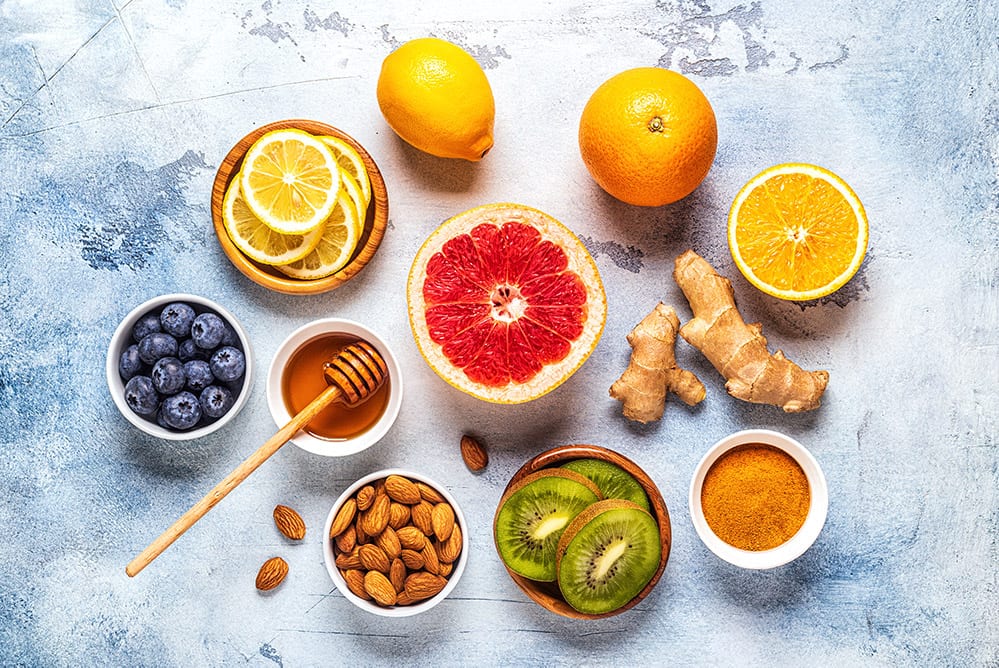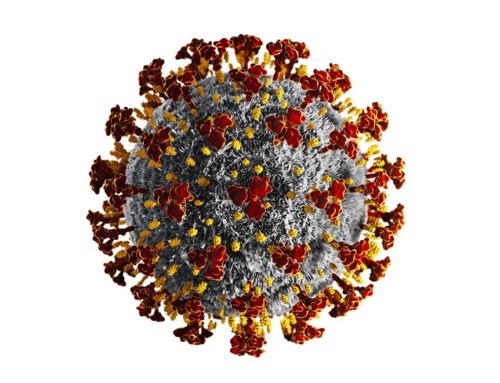As COVID-19 continues to spread globally, a proper functioning immune system is more important than ever before. Our natural immunity is our first line of defence against all illnesses, including COVID-19. It is therefore imperative that we focus on our overall health.
Now declared as a pandemic, COVID-19 continues to take its toll on people’s health, and hundreds of thousands have already fallen victim to this largely unknown ilness. In this article we have suggested some specific nutrients that will assist in safeguarding your health at this time. The immune system’s role is to defend your body against disease by fighting infection. The article below provides some insights into how to help the immune system better protect you.
The medical definition for infection is “The invasion and multiplication of microorganisms such as bacteria, viruses, and parasites that are not normally present within the body. An infection may cause no symptoms and be subclinical, or it may cause symptoms and be clinically apparent. An infection may remain localized, or it may spread through the blood or lymphatic vessels to become systemic (bodywide)”.
The body has many interconnected working parts: white blood cells, antibodies, bone marrow, the spleen, the thymus and lymphatic system. These cells and organs operate in concert to hunt down and destroy dangerous pathogens, such as viruses like Covid-19, that enter your body. To augment the body’s natural protective response, we suggest keeping good hygiene, get quality sleep, minimize stress (not easy right now!), exercise, maintain a healthy weight, do not smoke or vape, limit alcohol consumption and keep a healthy diet which includes a nutrient supplement.

How The Immune System Works
The following is a brief description of how the immune system works, reviewed by Dr Larrisa Hirsch – When the body senses foreign substances (called antigens), the immune system works to recognize the antigens and get rid of them. B lymphocytes are triggered to make antibodies. These specialized proteins lock onto specific antigens. The antibodies stay in a person’s body. That way, if the immune system encounters that antigen again, the antibodies are ready to do their job. That’s why someone who gets sick with a disease, like chickenpox, usually won’t get sick from it again. Although antibodies can recognize an antigen and lock onto it, they can’t destroy it without help. That’s the job of the T cells. They destroy antigens tagged by antibodies or cells that are infected or somehow changed. (Some T cells are actually called “killer cells.”) T cells also help signal other cells (like phagocytes) to do their jobs.
The Role of Nutrition
The food and liquids you consume have a profound effect on everything you do. Whether you are working, exercising, sleeping or just watching TV, what’s in your body makes a difference. Many of the chronic diseases people experience can be avoided by maintaining a healthy diet and an active lifestyle. Nutrition may be the most vital component in maintaining – or gaining – a healthy immune system. Nutrition also plays an important role in functions like promoting tissue repair, and in the body’s effectiveness to reclaim flagging energy.

Essential Nutrients
The essential nutrients are carbohydrates, protein (amino acids), fat, vitamins, minerals and water. They are considered ‘essential’ because the body cannot produce them, yet there are vital for the body’s growth, maintenance and repair. We find these essential nutrients in the food we eat. But satisfying your nutrient quota from food alone is almost impossible, which means one should supplement by taking additional nutrients in the form of a multivitamin or similar.
Vitamins and Minerals to the Immune System Rescue
Eating foods chock-full of vitamins is an excellent way to strengthen your immune system and stay healthy all season.
In the wake of the Covid 19 pandemic, a panel of researchers, hosted by Dr. Manfred Eggersdorfer, Professor for Healthy Ageing at the University Medical Center Groningen published a list of key findings on the role of micronutrients (vitamins and minerals) for supporting the immune system. The focus of the panel’s work is to educate consumers, in light of the coronavirus outbreak, in eating nutritious foods that keep you healthy.
The panel reviewed the evidence on micronutrients such as vitamin A, C, D, E, iron, selenium, copper and magnesium. Dr Eggersdorf reported, ”If there is a deficiency or marginal status in these micronutrients, this can negatively affect the immune function and decrease the resistance against infection.” The micronutrients support both the innate and adaptive immune responses. Our innate immunity is the natural response system that we are born with. It is activated by the chemical properties of the antigen (anything harmful to the body). The adaptive immunity refers to antigen-specific immune response. It is the immunity that develops throughout our lives whenever we are exposed to specific diseases or when we’re immunized against them with vaccines. Our body needs both processes to function optimally.
Micronutrients (vitamins and minerals) are vital to white blood cell (leukocytes) effective functioning. White blood cells originate in the bone marrow but circulate throughout the bloodstream. These cells help fight infections by attacking bacteria, viruses, and germs that invade the body. Micronutrients promote good cell functioning and cell adherence.
Some important vitamins to consider taking to boost immunity
Vitamin A is the generic term for a group of fat-soluble compounds that are highly important for human health. Vitamin A boosts immunity, lowers your risk of infection and supports wound healing through collagen strength. They’re essential for many processes in your body, including maintaining a healthy vision, ensuring the normal function of your organs and aiding the proper growth and development of babies in the womb.
B vitamins have a direct impact on your energy levels, brain function, and cell metabolism. There are 8 essential B-vitamins and each is important for different reasons. These include vitamin B1 (thiamin), B2 (riboflavin), B3 (niacin), B5 (pantothenic acid) B6 (Pyridoxine), B7 (biotin), B9 (Folate) and B12 (Cobalamin). B12 is a powerful cold- and flu-fighting nutrient, as is vitamin B6, another important, germ-combating vitamin that naturally strengthens your immune system. Researchers in the US have found that high doses of B-vitamin supplements may “completely offset” the damage caused by very fine particulate matter – protecting against the damaging effects of air pollution. Vitamin B9 and folic acid help repair tissues and aid in cell metabolism and immune support.
Dr Anitra Carr, whose research speciality with vitamin C, reports that in the case of infection, the body uses more of the micronutrients, especially vitamin C, and hence, there is a legitimate need to take high doses of these micronutrients to fight infection. Her review of current vitamin C research indicated that it could prevent and treat respiratory and systemic infections by enhancing immune cell functions. She recommends the intake of at least 200mg per day to reduce the risk of infection and a even higher dose of 1 to 2 grams per day to decrease the severity of infection. Chinese researchers are in the process of conducting clinical trials to investigate the effects of vitamin C on patients with COVID-19. Researchers at Zhongnan Hospital in China have announced that they will investigate the effectiveness of vitamin C infusion for the treatment of severe COVID-19 cases. Many of the deaths associated with this viral pneumonia appear to be due to septic shock, and studies suggest high-dose vitamin C infusions can improve outcomes in cases of sepsis and respiratory infections.
Dr Eggersdorfer reported that vitamin D is important because many immune cells have vitamin D receptors. Vitamin D promotes the differentiation of monocytes to microphage and increases the killing capacity. The daily recommended intake is 50mg. Research shows high-dose vitamin D supplementation lowers the risk of respiratory illnesses and lung infections in the elderly by up to 40%
The essential mineral Zinc is another protective antioxidant that helps create and activate your immune system’s white blood cells. Antioxidants are compounds found in foods that prevent cell damage caused by free radicals. Free radicals are normal byproducts of processes like metabolism that are formed in your body that can damage the cells in your body. Zinc is essential in the enzymatic reactions needed for wound healing, cell division and growth and the breakdown of carbohydrates. Zinc is also important for collagen production.
Selenium is another essential trace mineral with powerful antioxidant qualities. It fights oxidative stress in your body, which reduces inflammation and enhances immunity. Studies have demonstrated that increased blood levels of selenium are associated with enhanced immune response.
Optimizing Your Gut Health with Probiotics

Although scientists only started researching probiotics in the 1990’s, they have been inextricably linked to human health for thousands of years. People have consumed probiotics in the form of fermented foods, beer, wine, yogurt, cheese, kefir, for a long time. As it turns out these fermented foods contain probiotics that are critical for the digestive tract. Probiotics are live microorganisms commonly known as friendly, good, or healthy bacteria. They are widely regarded to promote a healthy digestive tract and immune system. The health benefits derived from probiotics are mostly associated with balancing the intestinal bacteria. According to the National Center for Biotechnology Information, “The first line of defense against the entry of pathogens is represented by the gut membrane barrier and probiotics may prevent pathogen-induced membrane damage by inhibiting pathogen adhesion and maintaining the correct organization of the tight junction and cytoskeleton proteins.”
The introduction of probiotics in the diet has been shown to reduce incidences of psoriasis, colitis, allergies and many other diseases. The human gut is more complex and indeed more important than was previously thought. A healthy gut contributes to a strong immune system, including a healthy heart, brain, improved mood, quality sleep, and effective digestion. The old adage of, ‘we are what we eat’ may never be truer!
Fiber to Optimize Digestion and ‘Up’ Your Immunity
Dietary fibre (also known as prebiotics) is found in cereals, fruits, and vegetables, and act as the fertiliser for the gut. Fibre is made up of the indigestible parts or compounds of plants, which pass through our stomach and intestines. Fibre promotes bowel movements and keeps waste move through the colon, while at the same time benefiting your heart health and controlling the blood sugar. There are two types of fiber: soluble, which easily dissolves in water and becomes gel-like, and insoluble, which doesn’t dissolve and remains intact as it moves through the colon. Both types of fibre are important for digestion.
The importance of gut health
The importance of eating with your gut health in mind cannot be overstated. Studies have found that having a healthy gut microbiome is vital to a strong immune system. It prevents invasions from other microorganisms and maintains the inner lining of the intestinal tract – effectively performing a barrier effect from unwanted pathogens. A healthy, diverse and balanced gut microbiota is key to ensuring proper digestive functioning. According to professor Ana Valdes, “Lower bacterial diversity has been reproducibly observed in people with inflammatory bowel disease, psoriatic arthritis, type 1 diabetes, atopic eczema, coeliac disease, obesity, type 2 diabetes, and arterial stiffness”. It is important to note that in studies conducted on animals show that artificial sweeteners (sugar subsittutes) containing sucralose, aspartame and saccharin may have negative effects on the gut microbiota. Food additives, such as emulsifiers, which are found in most processed foods have also been shown to affect the gut microbiota negatively.

Drink water!
As important as any food you eat, drinking adequate water is vital for flushing food through your system, flushing toxins and keeping your body hydrated. Many turn to so-called “sports drinks” for hydrating while exercising, but clean water is the ideal beverage.
Nhlayisa products contain all of the above-mentioned micronutrients. Please contact us so we may recommend nutritious solutions for your staff and school children.
For further reading on other specific nutraceuticals which is considered essential to protecting yourself against the Coronavirus, please follow this link –
https://articles.mercola.com/sites/articles/archive/2020/03/09/coronavirus-prevention.aspx







Leave A Comment